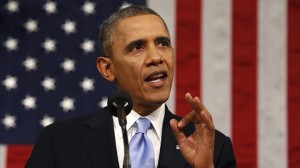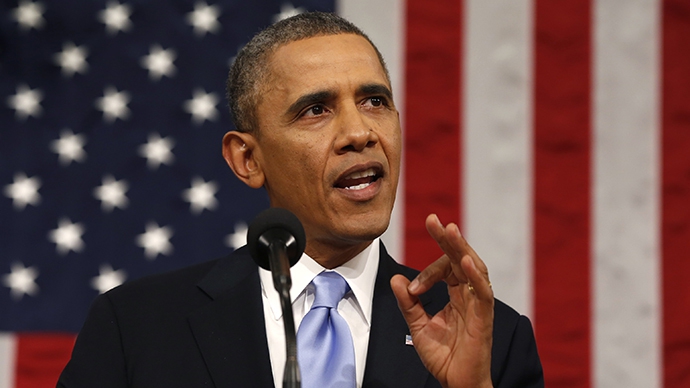 When US President Barack Obama delivered his sixth State of the Union address Tuesday night, those listening at home may have heard variations on a theme that Obama focused on in his fifth address: the US economy and a growing inequality gap.
When US President Barack Obama delivered his sixth State of the Union address Tuesday night, those listening at home may have heard variations on a theme that Obama focused on in his fifth address: the US economy and a growing inequality gap.A Pew Research Center poll recently found that the majority of Democrats and Republicans alike feel that economic inequality has grown over the last decade. The same researchers also found that an overwhelming number of Americans are in favor of extending federal benefits for the long-term unemployed and raising the minimum wage.
Growing frustration with the issue has not escaped the president, who called upon lawmakers to put aside partisan squabbling and help struggling Americans.
"In the coming months, let�s see where else we can make progress together. Let�s make this a year of action. That�s what most Americans want � for all of us in this chamber to focus on their lives, their hopes, their aspirations. And what I believe unites the people of this nation, regardless of race or region or party, young or old, rich or poor, is the simple, profound belief in opportunity for all � the notion that if you work hard and take responsibility, you can get ahead," he said.
"Let�s face it: that belief has suffered some serious blows. Over more than three decades, even before the Great Recession hit, massive shifts in technology and global competition had eliminated a lot of good, middle-class jobs, and weakened the economic foundations that families depend on," Obama went on.
"Today, after four years of economic growth, corporate profits and stock prices have rarely been higher, and those at the top have never done better. But average wages have barely budged. Inequality has deepened. Upward mobility has stalled. The cold, hard fact is that even in the midst of recovery, too many Americans are working more than ever just to get by � let alone get ahead. And too many still aren�t working at all."
Obama also promised that, as his legacy comes into question, the commander-in-chief does not plan to stand idly bye and permit rival lawmakers prevent progress. He implicitly threatened to use executive authority, which allows the president to act without congressional approval, in order to expand the shrinking middle class.
"Our job is to reverse these tides. It won�t happen right away, and we won�t agree on everything. But what I offer tonight is a set of concrete, practical proposals to speed up growth, strengthen the middle class, and build new ladders of opportunity into the middle class. Some require Congressional action, and I�m eager to work with all of you. But America does not stand still � and neither will I. So wherever and whenever I can take steps without legislation to expand opportunity for more American families, that�s what I�m going to do," he said.
�Opportunity is who we are. And the defining project of our generation is to restore that promise.�
He also reminded the public that 2014 will be the final year in which US troops are on the ground in Afghanistan, and reiterated his 2009 call to close the prison facility at Guantanamo Bay, Cuba. Obama said the US does not wish to be seen as the country that fights terrorism at the expense of constitutional law, saying "this needs to be the year Congress lifts the remaining restrictions on detainee transfers and we close the prison at Guantanamo Bay.�
Obama also said that the US must build on the increased energy production and continue to work toward higher fuel efficiency standards.
�The shift to a cleaner energy economy won�t happen overnight, and it will require tough choices along the way. But the debate is settled. Climate change is a fact," he said. "And when our children�s children look us in the eye and ask if we did all we could to leave them a safer, more stable world, with new sources of energy, I want us to be able to say yes, we did.�
He also warned congressional lawmakers against voting in favor of tougher sanctions against Iran, just as the negotiations between Iran and the west have turned hopeful for the first time in recent memory.
"If John F. Kennedy and Ronald Reagan could negotiate with the Soviet Union, then surely a strong and confident America can negotiate with less powerful adversaries today," Obama said. "The sanctions that we put in place helped make this opportunity possible. But let me be clear: if this Congress sends me a new sanctions bill now that threatens to derail these talks, I will veto it."
"For the sake of our national security, we must give diplomacy a chance to succeed. If Iran�s leaders do not seize this opportunity, then I will be the first to call for more sanctions, and stand ready to exercise all options to make sure Iran does not build a nuclear weapon. But if Iran�s leaders do seize the chance, then Iran could take an important step to rejoin the community of nations, and we will have resolved one of the leading security challenges of our time without the risks of war."
With the Democrats hoping to keep their majority in the Senate and regain the House of Representatives in the midterm elections later this year, pundits deemed it likely that Obama would help his party by laying a foundation for that message during the State of the Union.
�I think what you�re going to hear from the president on Tuesday night is a series of concrete, practical, specific proposals on how we restore opportunity through a wide set of means: job training, education, manufacturing, energy,� said White House advisor Dan Pheiffer on Fox News Sunday. �And these will be some legislative proposals, but also a number of actions he can take on his own.�
One of those legislative proposals was a plea to Republicans to cooperate on immigration reform. There are an estimated 11 million undocumented workers currently residing in the US, and Republicans - who have been reluctant to endorse any meaningful legislation on the national level - could be more willing to sign a bill if it means the GOP will have far better chance at the polls.
�I think the president � despite the reality of the House � needs to continue to promote that this has to be done comprehensively,� Rep. Raul Grijalva (D-Ariz.) told USA Today. �If a piecemeal approach is something he�s asking [Democrats] to be open to, he has to be pretty strong about saying the piecemeal [legislation] that only deals with enforcement issues or that only makes Republican caucus in the House happy is not immigration reform.�
By Russia Today
The Iran Project is not responsible for the content of quoted articles.











